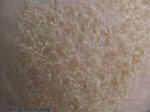Seasonal Eczema Can Be Affected By Different Things At Different Times Of The Year
Seasonal eczema can be affected by the weather all year round.
You or your child's eczema maybe made worse by winter weather, summer weather or changing weather. It could even be all three.

Winter and Seasonal Eczema
I am more prone to flare ups in the winter. If your eczema is more of a problem in the cold weather it could be because of a few reasons.
- The actual weather. The wind can have a drying out effect on the skin. Keep your skin moisturised, and protected from extreme weather conditions
- Central heating. It takes the moisture out of the air, drying the skin. Having a small window open, especially at night can help. Turning off the radiator in the bedroom will help you have a better night sleep
- Clothing. Avoid wearing wool. Layering up in cotton would be much less irritating on the skin
Summer Eczema
The summer weather can also have a drying effect on the skin. If the warmth of the summer causes you a problem then there a few things you can do which night help.
- Spending some time outside can help to improve your eczema. It is just important to remember to be careful with how much time you are in the sun. If you plan to be out in it for a while then wear a good sun cream, and perhaps even a hat. You don't want to replace your flare up of eczema with painful sunburn!
- Keep hydrated. Drink plenty of water. It helps to keep the skin moisturised and to keep you cool.
- Wear suitable clothing. Having eczema can make some sufferers want to cover up. If you feel more comfortable doing so wear loose fitting cotton clothing. But remember that the sun can be helpful in improving the condition of the skin.
The Changing Weather
Here in the UK our weather is forever changing, sometimes from day to day. You may live in a similar climate. A change in humidity can be a problem for eczema sufferers. As can your actions when a weather change occurs.
For example, in the winter you may have a couple of covers on your bed to keep you nice and snug on a cold night. Then suddenly the temperature increases a few degrees. You have had these covers on your bed for a few months and haven't given it a thought to take one off.
During the night your skin gets hot. It becomes itchy. You suddenly find yourself scratching. If you are like me, you seem to do it in your sleep! Then the itch-scratch cycle begins.
Whatever is effecting your skin, it is very important to keep your skin moisturised. That includes using emollients, and keeping hydrated.
It is great if you can prevent a flare up rather than have to treat one. If you can figure out which weather conditions effect your eczema then that is half the battle. Whether its the heat of the summer or the cold of winter you will better able to prevent them from irritating your skin more.
Return from Seasonal Eczema to Triggers of Eczema
Return from Seasonal Eczema to What is Eczema
Search What Is Eczema?
Advertising on What Is Eczema?
We are a participant in the Amazon Services LLC Associates Program, an affiliate program which allows sites to earn fees by advertising and linking to amazon.com. If you make a purchase through a link on this page, I may receive a small commission, at no extra cost to you. Many thanks
